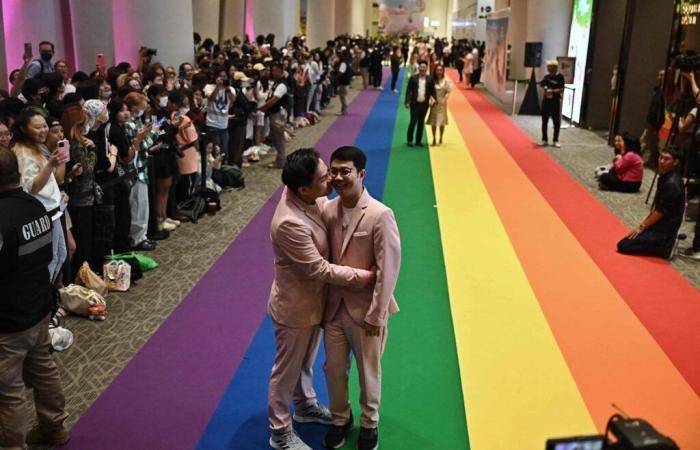
“Today is an exceptional day. We have the right to love, like others,” smiles Sappanyoo Panatkool, 38, after marrying her partner Apiwat Apiwatsayree, 49, who wiped away a tear during the ceremony. The two actors, in matching beige suits, are among the first couples to receive their marriage certificate, bordered in pink, from the authorities.
Marriage for all: the third Asian territory
Thailand has become the third Asian territory to recognize equal marriage, after Taiwan and Nepal. Only around forty countries in the world have taken the plunge, since the Netherlands in 2001.
“We are so happy. We have been waiting for this day for 10 years,” said Thanaphon Chokhongsung, 59. This Thai woman united with her partner Sumalee Sudsaynet, 64, in a district of the capital Bangkok with an evocative name: Bang Rak, “rak” meaning “love” in Thai. Mass celebrations also took place in the convention hall of one of Bangkok’s largest shopping malls, where officials were set up to manage the influx of requests, in a festive atmosphere.
-The new marriage law, promulgated by King Maha Vajiralongkorn in September, no longer includes gender references and gives homosexual couples the same rights in matters of inheritance, property or adoption as heterosexual couples. Gay marriage is generating a rare consensus in Thailand, in a context of growing polarization between the conservative bloc favorable to the army and the king, and the progressive opposition supported by the younger generations.
Despite this progress on marriage, transgender or non-binary people still do not have the right to change the mention of their sex on their identity documents in Thailand, the next battle to be won for local LGBT+ rights activists. “People who don’t identify with their biological sex are like homeless people,” said Ploynaplus Chirasukon, who married his longtime partner in Bangkok. “The possibility of changing one’s sex in civil status would allow true equality.”





